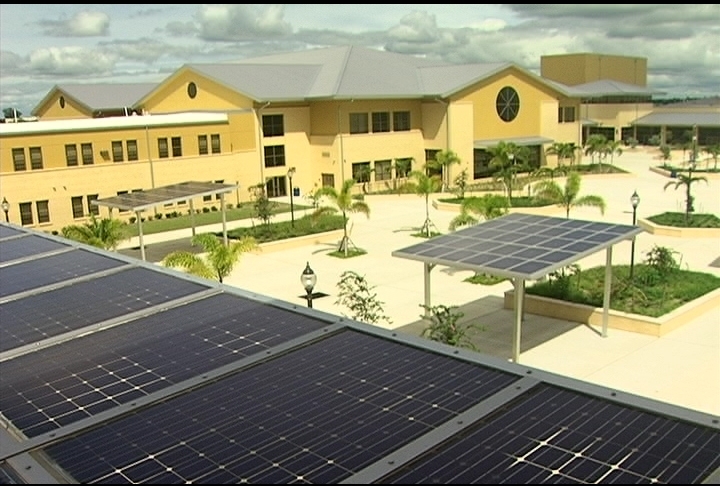
Solar Panels at Charlotte High School – the first full campus LEED Gold Certified public school in the Southeast. April 22, 2011. (by Charlotte County, FL)
This week marked the one year anniversary of the
Deepwater Horizon Oil Spill. Throughout the past year, communities across the Gulf coast have worked hard to diversify their economies to be more resilient. The
Clean Economy Development Center (CEDC) has established a model of collaboration that brings together local communities, federal agencies, nonprofits, and businesses to rebuild neighborhoods to be more environmentally and economically sustainable.
Charlotte County recently hosted the “
CEDC Clean Economy Roadshow,” spotlighting their innovative recovery work. Charlotte County, on Florida’s west coast, is home to almost 160,000 residents. Over the past seven years, the County’s primary industries of construction and tourism have struggled from the economic recession, three hurricanes, and the BP oil spill. Jason Stoltzfus, Program Liaison for Charlotte County, notes that by 2010 the unemployment rate was 13% and property values had gone down by 42%. In response, the county has worked hard to build a more sustainable economy, job market, and tax base by diversifying the County’s economic focus to include green technologies, renewable energy, medical information technology and life sciences.
Charlotte County has partnered with local businesses and leveraged
FEMA funding to assist with rebuilding a more resilient community. Sustainability and energy are at the core of the County recovery plan – creating sustainable businesses and jobs while reducing energy needs and costs. Some of their innovative projects include:
LEED Buildings
In the rebuilding process following Hurricane Charley, five of the public schools earned LEED (Leadership in Energy and Environmental Design) certification. Charlotte High School is the first full campus LEED certified public high school in the Southeastern United States.
Annual Energy Conference
The County hosts a two day conference – the Green Future Expo and Energy Options Conference – that promotes green energy, sustainable construction and economic growth. Over 3,000 people have attended the conference.
Solar Hot Water Service
Through a partnership with a local business, the County is in the process of establishing a Solar Hot Water Service program that will provide residents a low cost method for lowering their utility bills with no upfront costs. The program will generate jobs, provide the county with additional revenue through a profit share, and enable residents to switch to solar energy with no upfront or additional cost.
Babcock Ranch
The County is working with the legislature to permit the development of Babcock Ranch – the first city planned to be 100% powered by solar energy. The majority of the power would be generated by the largest on-site solar photovoltaic facility in the world.
Charlotte County is a small but mighty county with a clear vision of how to rebuild in a manner that is both sustainable and more resilient to future disasters. Next month, Stoltzfus will join leaders from communities across the Gulf Coast to share ideas and experiences at the Gulf Coast Sustainable Economies Leadership Academy. CEDC is partnering with the
Corporation for National and Community Service and the
Institute for Sustainable Communities will be hosting a free training, peer learning and technical assistance workshop in New Orleans. The goal is to help catalyze community-based sustainable development in Gulf Coast communities.
Divya Kumaraiah is the Policy Assistant to the White House Office of Social Innovation and Civic Participation
